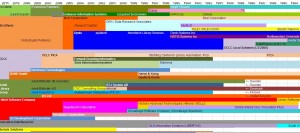This week has been distinguished by the exceptionally good Access 2011 conference. The program is something that I think every member of #libr511 could identify with, please look at it. Please think about it. We need to converse back to the school about what it represents, somewhat in context to the ‘cataloguing and classification’ curriculum certainly.
I could discuss a lot of the program, so could a few other attendees from the #libr511 cohort, check out the topic on twitter. I will directly comment on the keynote.
As the vision for “The University” takes shape (I think we are treating “the Library” as part and parcel of “the University”) discussions of access, ownership and preservation roll. Does it shock when a speak takes exception to the word access? I truly am dependent on every moment of bubble bursters and those who give us focus. I think Jon Beasley-Murray did that this morning.
He unequivocally centred the library with other public activity that is difficult, anticapitalist and productive. The to do list was short and I question if we are committed to it. Libraries must,
- Provoke criticism
- Remain central to models of ownership (and content creation) digital AND PHYSICAL
- Allow for space for reading
I believe the repository function is core the diversifcation of content creation; a protection from the overly agressive systems of commercial content mills (Pearson, Blackboard, Scholastic, HarperCollins, Apple, et al.) The very mechanic of library selection is a sort of ballast on a future that could be dominated by robotic access only.
“Access is not enough.”

